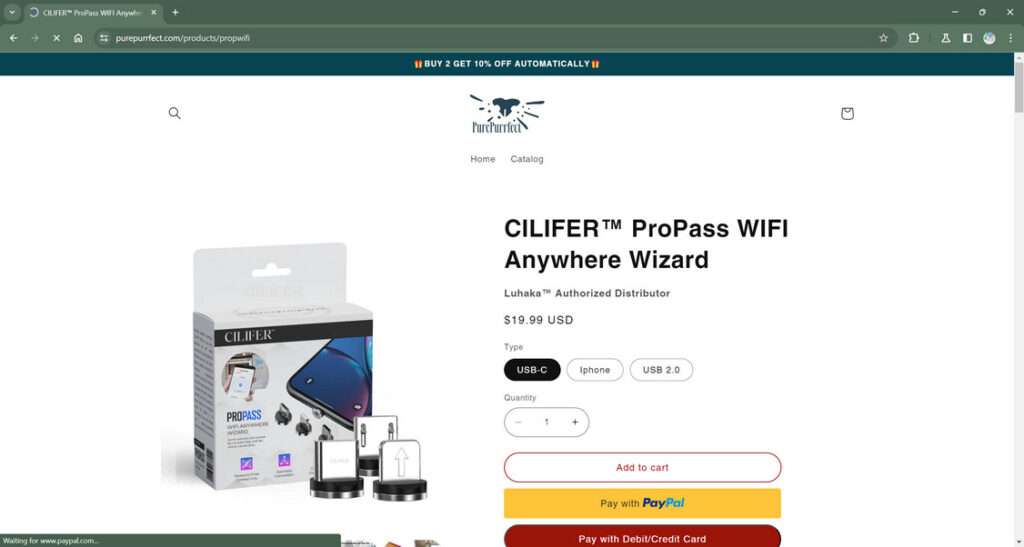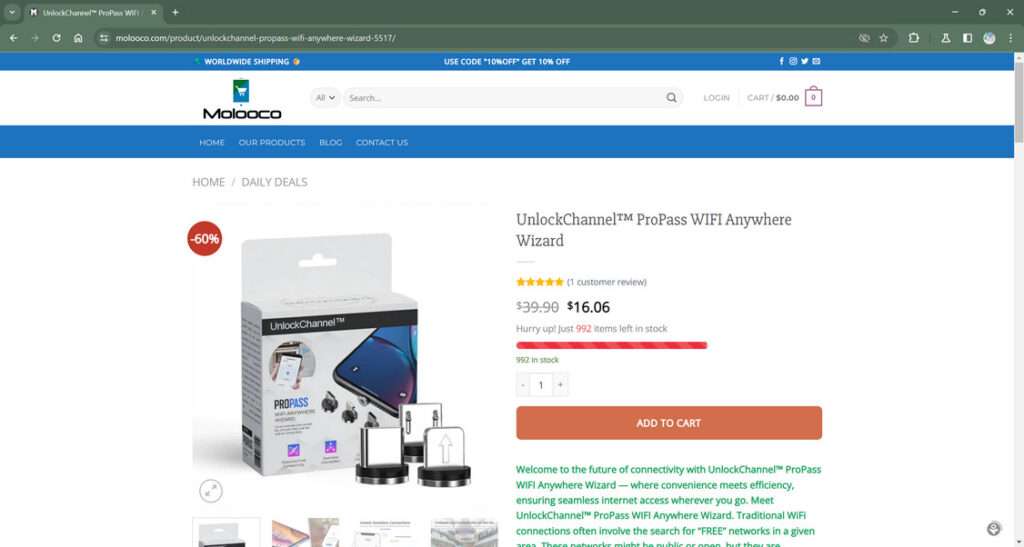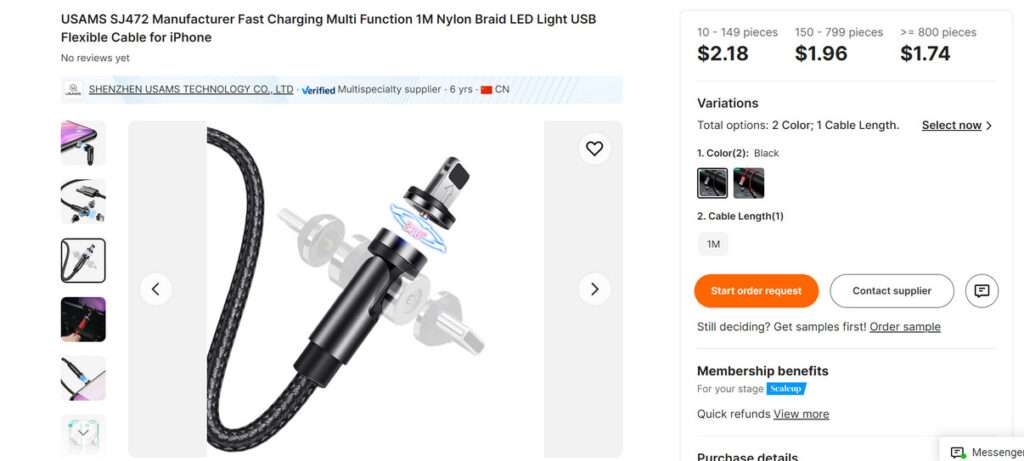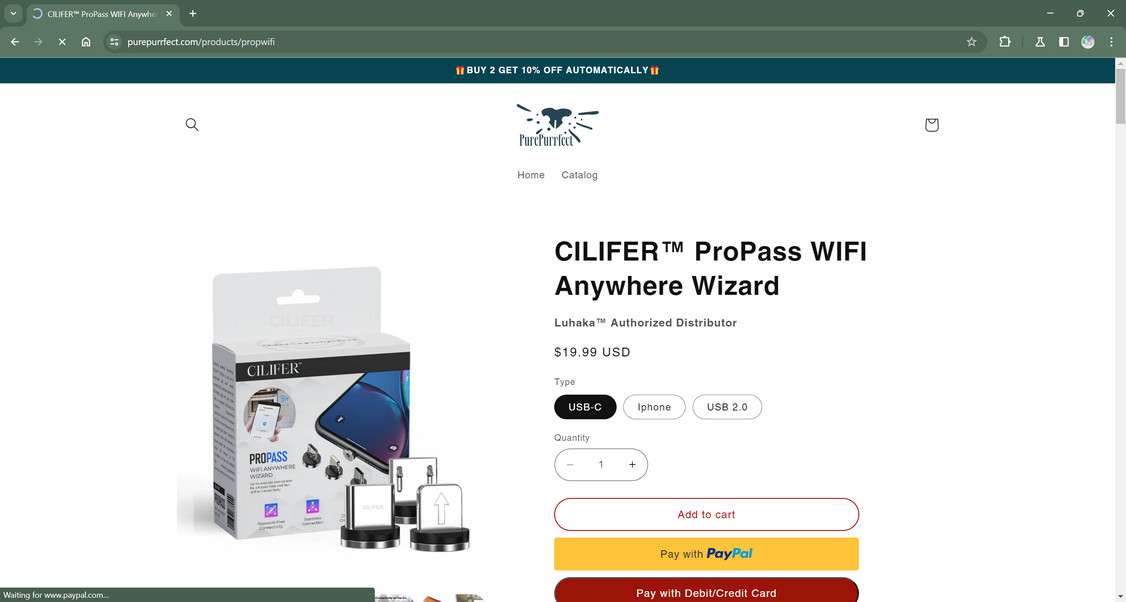Have you seen ads online for a revolutionary device called the CILIFER ProPass WIFI Anywhere Wizard that promises to unlock any WiFi network instantly without a password? As tempting as effortless, unlimited free public WiFi sounds, unfortunately the CILIFER ProPass is an outright scam designed to trick unsuspecting consumers out of their hard-earned money.
- Overview – Understanding the CILIFER ProPass Scam Campaign
- How the CILIFER ProPass Scam Operates
- Breaking Down the False Claims About CILIFER ProPass Capabilities
- What You’ll Actually Receive if You Order CILIFER ProPass
- Steps to Take if You Already Ordered CILIFER ProPass
- How to Avoid CILIFER ProPass Scams in the First Place
- Frequently Asked Questions About the CILIFER ProPass Scam
- The Bottom Line
This comprehensive guide will take an in-depth look at how the CILIFER ProPass scam operates, what victims can expect if they fall for it, and most importantly how to avoid getting ripped off by these deceptive marketing tactics in the first place.
Whether you’ve seen the ads on Facebook, YouTube, TikTok or elsewhere, beware – the CILIFER ProPass is not the WiFi hacking miracle it claims to be. We’ll uncover the truth behind this shady scam.

Overview – Understanding the CILIFER ProPass Scam Campaign
The CILIFER ProPass WIFI Anywhere Wizard is advertised through slick social media ads and questionable affiliate marketing websites as a revolutionary plug-and-play device that can magically connect to any WiFi network without needing a password.
As per the narrative spun in these ads, the CILIFER ProPass was invented by “Matteo”, a genius Swiss engineer with multiple advanced degrees from elite institutions like MIT. As the origin story goes, Matteo was on a business trip in Germany and got frustrated when he couldn’t find a reliable free public WiFi network to use.
This prompted him to create a compact USB device that can harness an “emergency pathway” present in all WiFi routers to connect to any private, password-protected network instantly. The ads boast the CILIFER ProPass taps into a hidden backdoor in WiFi protocols for emergency services, allowing anyone to access strong, high-speed internet on the go without passwords or complications.
The outlandish capabilities claimed in the carefully-worded sales copy include:
- Connect instantly to any home, office or public WiFi network without needing passwords
- Boost overall internet speeds by 40-170% for faster streaming, downloads and web browsing
- Strong security protocols that protect personal data and keep all connections private
- Universal, geography-agnostic compatibility that provides internet access anywhere in the world
- No more frustrating hunting for unreliable free public WiFi hotspots while traveling
- Compact and portable design requiring only simple plug-and-play USB connectivity
Hundreds of fake 5-star reviews, evidently left by paid shills and bots, talk up the remarkable functionality of this otherwise unproven and unlikely device. Expensive TV-style advertising compares it to pioneers like Steve Jobs and Nikola Tesla selling a vision of unlimited, hassle-free internet connectivity.
The CILIFER ProPass listings utilize other standard tricks straight out of the scammer playbook as well. Countdown timers create an illusion of manufactured scarcity, pressuring prospective buyers to purchase before time runs out. Huge “50% off Sale” tags provide instant discounts and a false sense of scoring an incredible bargain.


They cherry-pick and prominently display positive feedback while suppressing negative reviews or banning users who ask commonsense questions. Many use fake trust badges and security seals to reassure visitors. And despite outlandish claims of being a widely-covered viral sensation, mentions only appear on dubious websites linked to the scammers themselves.
Pricing typically varies between $19 per device and up to $89 if victims bundle more of these “devices”. Online payments are processed quickly via Stripe or PayPal before victims receive any physical products by mail.
What arrives in buyers’ mailboxes some 2-3 weeks post-payment is lightyears away from the futuristic WiFi wizardry advertised. The packages throughly debunk myths of Swiss innovation and MIT brilliance. Instead of any advanced electronics, recipients receive generic magnetic phone charging cables easily sourced wholesale from Chinese markets for under $2 apiece.

In other words, victims pay upwards of $89 for cheap accessories worth cents in actuality. And by the time the delivery arrives, online traces of the scammers disappear entirely. Websites vanish overnight, company addresses turn out to be empty lots, customer service numbers go unresponsive and email complaints bounce back undelivered.
There is little-to-no recourse left for defrauded buyers to recover lost money or return the worthless products received. For the fly-by-night fraudsters, however, the profits numbers are incredible from what is essentially a four-step routine:
- Craft enticing social media ads for non-existent products
- Process payments quickly through e-commerce storefronts
- Mail $2 cheap products from China bought in bulk
- Vanish without addressing complaints
Rinse and repeat. New sites under different names selling the same imaginary CILIFER ProPass WiFi under stories recycled from past successes keep the cash flowing into cryptocurrency exchanges. Ultimately, victims are left holding the bag wondering what just hit them while crafty scammers laugh themselves to the bank after pulling off yet another sale of ordinary phone cords as magical WiFi wizards.
How the CILIFER ProPass Scam Operates
The marketers behind the CILIFER ProPass have crafted an intricate scam funnel designed to convince victims they are buying an incredible new technology. Here is an in-depth look at how the ruse works:
Step 1: Enticing Social Media Ads
The first step is plastering eye-catching ads across social media portraying the CILIFER ProPass as a futuristic WiFi hacking device.
The ads feature urgent messaging like “Fix Your Slow WiFi!”, appealing to frustration over spotty public networks. Fake renders make the device look high-tech and advanced.
This grabs the attention of those seeking better WiFi access, priming them as potential victims.
Step 2: Misleading Sales Pages with False Claims
Once you click an ad, you are taken to an elaborate sales page with false claims about CILIFER ProPass capabilities, such as instantly connecting to any WiFi and enhancing speeds.
These pages use deceitful tricks like fake customer reviews, phony limited-time countdown timers, and non-existent security badges to appear legitimate.
In reality, the pages are completely fabricated by the scammers. But the convincing presentation persuades victims to buy.
Step 3: Upsell with More Lies During Checkout
The checkout process contains additional deception tactics. Victims are shown more fake reviews, pressured with claims that stock is running out, and told they need to buy router adapters or cables for full functionality.
This piles on more bogus upsells that trick buyers into spending even more for useless add-ons.
Step 4: Sending a Cheap, Generic Product
After completing checkout, victims never receive the promised CILIFER ProPass WiFi wizard. Instead, they receive a cheap generic item like:
- Basic phone charging cables
- USB sticks containing manuals
- $2 worth of plastic trinkets
None of these as-shipped items can actually connect to WiFi without passwords as advertised. You are paying a huge markup on worthless junk.
Step 5: Ignoring Refund Requests
When angry customers inevitably ask for refunds after realizing it is a scam, their requests are ignored, denied, or stalled until it is too late to dispute with payment providers.
The scammers pocket the money and move on to the next victims. Rinse and repeat.
This is an overview of how the CILIFER ProPass scam operates from start to finish, creatively deceiving victims out of their money. Only by understanding their unethical tricks can consumers avoid getting ripped off.
Breaking Down the False Claims About CILIFER ProPass Capabilities
A core component of the CILIFER ProPass scam campaign is making outrageously false claims about what the device can actually do. Their exaggerated and manipulated assertions simply do not hold up to scrutiny.
Here is a detailed breakdown debunking their deceptive product claims:
It Cannot Unlock Any WiFi Network
The ads state that CILIFER ProPass utilizes special technology to connect to any WiFi network without knowing the password.
This is patently untrue – there is no magic wand that provides universal access to password-protected networks. Hacking WiFi is illegal and this compact device lacks the capabilities.
Unless you know the network name and password, you cannot connect. The CILIFER ProPass possesses no special hacking powers.
It Does Not Speed Up Your Internet
Another common claim is that using the CILIFER ProPass device will speed up your Internet by 40-170% compared to public networks.
This is utterly false and technically meaningless. Your Internet speeds are determined by your broadband provider and router capabilities, not a small USB adapter.
It cannot magically accelerate your throughput. The speed claims are fabrications.
It Provides No Added Security
Since it does not actually connect to private networks, the CILIFER ProPass does not provide any added security as claimed.
Public WiFi networks accessed normally are potentially risky, but this device does nothing to enhance security or privacy as it simply does not work.
It is Not Developed By Swiss Engineers
The backstory of CILIFER ProPass being invented by genius Swiss engineers is complete fiction. There are no renowned developers behind this product.
It is a cheaply made, generic item being deceptively marketed for profit by unknown scammers. Any credentials or qualifications stated are bogus.
It is Not Featured By Major Outlets
The ads frequently suggest major outlets like CNN, Forbes, and BuzzFeed have featured the CILIFER ProPass. This is not true.
No reputable news source has covered this scam device. The logos used are fake and the “as seen on” sections are fabricated.
Reviews Are Faked
All the glowing 5-star reviews shown are manufactured lies. There are no happy customers praising the CILIFER ProPass capabilities, because it simply does not work.
The scammers fabricate all reviews, feedback, and testimonials to dupe potential buyers. Do not trust anything you see.
In summary, the astronomical claims made about CILIFER ProPass functionality are demonstrably false in every respect. It provides none of the promised capabilities.
What You’ll Actually Receive if You Order CILIFER ProPass
So if the CILIFER ProPass doesn’t actually deliver seamless public WiFi as advertised, what do victims really receive?
Unfortunately, those tricked into ordering will merely get a cheap, generic item that costs a few dollars at most to produce.
Common examples of the worthless junk sent instead of the promised WiFi wizard include:
Low-Quality USB Charging Cables
Often you will receive a basic USB charging cable like those packed with phones, available for a couple dollars.
It will provide no WiFi functionality whatsoever despite the misleading marketing. Just an everyday cable.
USB Flash Drives
Some victims receive cheap USB flash drives with the storage space taken up by user manuals and documents.
Again, the drive cannot magically connect to WiFi networks. Just a common flash drive at inflated pricing.
Random Plastic Trinkets
In some cases victims report receiving random plastic gadgets like screen cleaners or desk toys.
These trinkets have no technological capabilities – just generic junk in place of the advertised product.
Empty Packages
In worst case scenarios, victims receive empty or near-empty packages with no products inside.
This outrageous practice provides absolutely nothing to buyers aside from proof of the scam. Just an empty box where the CILIFER ProPass was supposed to be.
The bottom line is you will receive cheap, everyday items easily sourced for a few dollars at most. Whatever arrives in the mail will not unlock public WiFi networks as aggressively promoted.
Do not expect any advanced technology or special features. The order will contain only mundane, nearly worthless objects that in no way deliver what was advertised to victims.
Steps to Take if You Already Ordered CILIFER ProPass
If you already fell prey to the captivating claims and purchased the CILIFER ProPass device online, all hope is not lost. Here are the steps to take to maximize chances of recouping your money:
1. Contact Your Bank or Credit Card Company
Immediately reach out to your bank or credit card company used for the purchase and state it was a fraudulent transaction. Ask to reverse the charges due to non-delivery of the advertised product.
Act quickly, as you typically only have 90 days to dispute the charges. Provide any proof of the inaccurate claims.
2. File a Complaint With the FTC
You can also file an official complaint with the Federal Trade Commission detailing the deceptive business practices utilized in the CILIFER ProPass scam marketing.
The more complaints submitted, the more likely authorities can build a case against the scammers.
3. Leave Online Reviews Describing the Scam
Post detailed reviews on sites like TrustPilot warning others about the CILIFER ProPass scam. This can help prevent the scammers from claiming more victims.
Include specifics of how the product did not match advertised claims and your trouble receiving refunds.
4. Warn Your Social Networks
Let your friends and followers on social media know that the CILIFER ProPass ads are a scam. Share your experience to keep others from falling for the false marketing.
Post on your feeds or send direct messages if you see someone considering the product so they avoid being defrauded.
5. Report Scam Ads and Websites
If you recall the specific website or social media ad that duped you, report them directly to the platforms so they can be taken down.
Reporting the accounts spreading the scam claims can disrupt their business model.
While getting back money lost to the scam can be difficult, taking these proactive measures can help in trying to recover funds, as well as prevent additional victims.
How to Avoid CILIFER ProPass Scams in the First Place
Considering the deceptive practices and outright lies utilized in the CILIFER ProPass scam funnels, your best course of action is avoiding their traps entirely. Here are ways to steer clear of their schemes:
- Avoid clicking on social media ads promoting unbelievable or sensational products, or using pressure tactics and urgency to drive clicks.
- Watch for red flags on product sites, like no real company info, fake reviews, or exaggerated claims that sound too good to be true.
- Search online for the product name plus “scam” or “review” to find unbiased feedback on if it is legitimate.
- Price check expensive products on sites like Amazon to gauge fair retail costs for similar items.
- Only buy from reputable sites you trust after conducting thorough due dilligence on a seller.
- Use a credit card for purchases whenever possible to enable chargeback disputes for fraud.
- Verify security badges on checkout pages by hovering over them to check if they are real and verifiable.
- Avoid products promoting “hacks” or workarounds for accessing services like free WiFi without proper permissions.
Applying healthy skepticism and utilizing scam detection strategies can help you recognize and avoid predatory scams like the CILIFER ProPass. Saving your money is better than trying to recover lost funds.
Frequently Asked Questions About the CILIFER ProPass Scam
The CILIFER ProPass scam campaign has generated a lot of questions for consumers wondering if the device is legitimate or another online rip-off. Below we answer some of the most frequently asked questions to provide clarity on this shady WiFi product:
Is CILIFER ProPass a Scam?
Yes, CILIFER ProPass is absolutely a scam designed to trick consumers out of their money through deceptive marketing and exaggerated capability claims. It cannot actually connect to any WiFi network as heavily advertised.
What Makes CILIFER ProPass a Scam?
Several clear red flags indicate the CILIFER ProPass is a scam:
- Outrageous claims of hacking any WiFi network instantly
- Completely fabricated founder backstory
- Fake reviews and doctored demonstration videos
- Sending only cheap, generic items, not the advertised device
- Ignoring refund requests from unsatisfied customers
What Do You Get if You Order CILIFER ProPass?
Victims receive only cheap items like basic cables or plastic gadgets worth a few dollars, not the advanced WiFi connecting technology advertised. The shipped items provide none of the exaggerated functionality claimed in the ads.
Does CILIFER ProPass Really Unlock Any WiFi?
No. Despite claims of specialized technology to access any WiFi network instantly without passwords, this is technologically impossible. The device possesses no special hacking capabilities.
Can CILIFER ProPass Speed Up Your Internet?
No. The assertions that CILIFER ProPass can accelerate your Internet speed up to 170% faster are completely fabricated. The device has no impact on your actual Internet speeds.
Is CILIFER ProPass Portable and Easy to Use?
Since victims do not actually receive the promoted CILIFER ProPass, there is no real device to use. Any claims around portability, ease of use, or capabilities are untrue.
Where Can You Safely Buy CILIFER ProPass?
Nowhere. The CILIFER ProPass does not exist as marketed and should not be purchased from any site or seller claiming to offer it. There is no legitimate retailer selling the imaginary public WiFi hacking device.
The Bottom Line
The CILIFER ProPass heavily promoted online as a remarkable WiFi unlocking invention is unequivocally a scam designed to defraud consumers through misleading claims and deceptive marketing tactics.
Buying this dubious device will only result in receiving shoddy products worth a fraction of the price charged. No special public WiFi hacking capabilities exist despite what ads may claim.
If you already ordered, take steps to issue chargebacks and report the scam. But ideally utilize the knowledge in this guide to recognize the underlying tricks and avoid becoming victimized by the CILIFER ProPass scam.
With vigilance, you can protect yourself and your hard-earned money from predatory products promising outrageous functionality that never materializes in reality. Stay safe!




